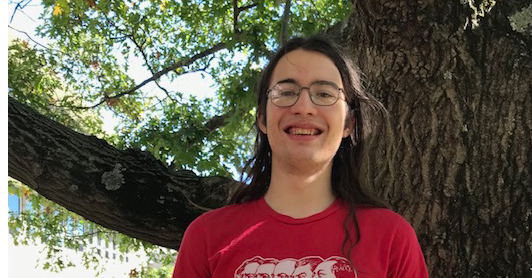Fueled by fate and serendipity and acquiescent to chance, Velde has developed a particular contrarianism that sets him apart from his peers and his generation.

Rhys Velde, a freshman at the Mount majoring in math and chemistry, is a self-described “physical incarnation of the ‘devil’s advocate” and a bright, intellectual, philosophical, creative, and contemplative individual.
Hailing from Missoula, Mont., Velde came to the Mount in search of a good chemistry program, though he believes “some combination of random occurrences happened to correspond with this present” and is rather indifferent toward the events and influences that ushered him to this particular college. “I also enjoy it here,” he added, “and wouldn't regret the decision even if I had the option to change the past.”
Fueled by fate and serendipity and acquiescent to chance, Velde has developed a particular contrarianism that sets him apart from his peers and his generation. For instance, Velde’s only source of transportation currently is biking, though it is entirely by choice—he hates driving. He has formed a self-sufficiency in getting to wherever he needs to go by bicycle. What’s more, Velde uses a flip phone because he believes iPhones and more modern cellphones are too frustrating to deal with.
So what is it that Rhys Velde actually enjoys?
For starters, he attends a Tango studio every once in a while—a dance he feels “brings a new perspective on how to walk and listen to music and it often engages my mind more than some of my classes.” While it takes a 12-mile bike ride just to get to the studio, Velde truly enjoys dance and the people he meets there—an area he can usually and easily find connections and a welcoming community. Velde observes that those who “gravitate towards tango are more loose and flexible...which would make that community different than one dedicated to the foxtrot for example. Personally though, while dance has taught me a lot more about how to listen to music, I still think my musical instincts come from band.”
Velde also appreciates debate, speaking, and thinking critically about issues that can be approached from multiple angles. It only makes sense that he’d joined the Mount’s Ethics Bowl. Here, he can exercise and practice his passions for oratory, community, reasoning, and philosophizing. Velde likes to share his opinions on certain subjects or any points arising naturally out of conversation, and so finds a sense of belonging in the Ethics Bowl. As opposed to writing out his thoughts, which he enjoys much less, Velde starts relationships by connecting over his gift for speech.
When it comes to his perceptions on existence, however, to delve into some of the things he might share in the Ethics Bowl, he is ostensibly nihilistic, though he believes in living life to the fullest—or at least experiencing contentment while we can. “Humanity doesn't matter,” he said, “I just hope we have a good time while it lasts.”
That being said, it makes all the more sense that Velde advocates for plunging into the present moment, which, according to him, “has already happened. We’re merely experiencing one slice of past, present, and future and have knowledge of events from one direction (what we would call ‘the past’).” Velde believes that we had free will when we made the decisions we did; however, since those decisions and actions have already occurred, free will becomes a “silly” concept. In rejection of the existence of free will, Velde is deterministic inasmuch as we determine our own fates. He is a self-determinist, perhaps.
Despite having no need for a creator and embracing nihilism, Velde calls for existential admiration, focusing on the infinite complexities and profundities upon which our ontologies are built and based, rather than finding purpose. The meaning of life, moreover, is merely to live it, and avoid getting caught up in our own supposed cosmic significance. For those who are downtrodden, disappointed, or otherwise disturbed by the pressures of existence, solace can be found in the beauty and pleasures of life—they must only first realize that life is valuable and livable solely because it inherently is and that “there was nothing you had to do in the first place!”
Dismissing the label “philosophical,” Velde merely described himself as “creative, curious, and a good storyteller.” And in all of man’s inexhaustible pontifications, perhaps all that was truly ever needed was simply a good story.

